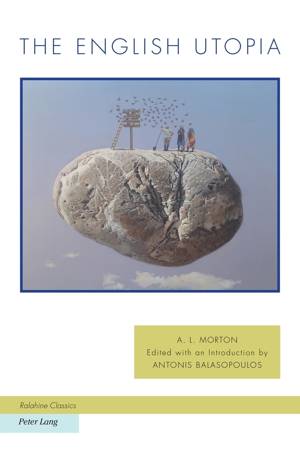
- Retrait gratuit dans votre magasin Club
- 7.000.000 titres dans notre catalogue
- Payer en toute sécurité
- Toujours un magasin près de chez vous
- Retrait gratuit dans votre magasin Club
- 7.000.000 titres dans notre catalogue
- Payer en toute sécurité
- Toujours un magasin près de chez vous
Description
«Antonis Balasopoulos is to be heartily thanked for bringing back into print A. L. Morton's marvelous book The English Utopia - and for providing us with not only a useful and insightful Introduction, but also a comprehensive bibliography of Leslie Morton's many writings. We definitely need such works in these difficult times when democracy is under siege by authoritarian forces. Morton's chapters may well truly serve both to empower our critical thinking and to inspire our radical-democratic imaginations.»
(Harvey J Kaye, Professor Emeritus of Democracy & Justice, University of Wisconsin-Green Bay)
«Antonis Balasopoulos describes his job as an 'exercise in historical reclamation.' He is due much gratitude for both the scrupulousness and the expertise he brings to his task. The Introduction is a model of its kind, positioning Morton in his own milieu as a committed intellectual. Morton's book more than deserves this careful attention. In this new Ralahine edition, The English Utopia appears as the seminal text in utopian studies it should have been. »
(Patricia McManus, Senior Lecturer, School of Humanities and Social Science, University of Brighton)
A. L. Morton's classic 1952 study of utopias in the context of British social history constitutes one of the earliest sustained engagements with the social and ideological sources of the utopian imagination, the importance of the class struggle for literary production and of literary production for cultural, if not political hegemony. Traversing English literary history from the medieval poem on the Land of Cockaygne to Sir Thomas More, to William Morris's News from Nowhere and the subsequent decline of the genre and the eventual rise of anti-utopian and dystopian strains in the early twentieth century, The English Utopia remains provocative and critically engaging more than seventy years after its original publication. In addition to charting its significance as an intervention, the present edition also brings to light Morton's complex role as Left political activist, historian, scholarly catalyst and cultural critic - a paradigmatic instance of the engaged and public intellectual.
Spécifications
Parties prenantes
- Auteur(s) :
- Editeur:
Contenu
- Nombre de pages :
- 242
- Langue:
- Anglais
- Collection :
- Tome:
- n° 30
Caractéristiques
- EAN:
- 9781789974188
- Date de parution :
- 13-11-23
- Format:
- Livre broché
- Format numérique:
- Trade paperback (VS)
- Dimensions :
- 152 mm x 229 mm
- Poids :
- 403 g







